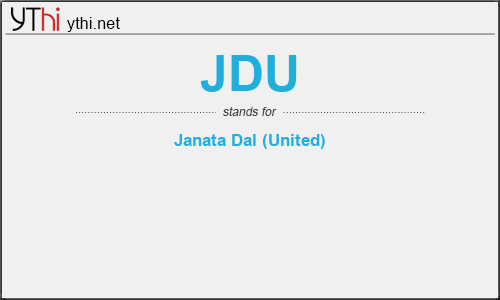What does JDU mean? What is the full form of JDU?
The Full Form of JDU is Janata Dal (United).
Janata Dal (United) abbreviated as JD(U) is a centre-left Indian political party with political presence mainly in eastern and north-eastern India.JD(U) is recognised as a state party in the states of Bihar and Arunachal Pradesh and is a part of government in Bihar. JD(U) heads the government in Bihar and is the second largest party in Arunanchal Pradesh. JD(U) won 16 seats in the 2019 Indian general election, making it the seventh largest party in the Lok Sabha. The party operates on the ideologies of socialism, secularism and integral humanism.
The Janata Dal (United) was formed with the merger of the Sharad Yadav faction of the Janata Dal, the Lok Shakti Party and the Samta Party on 30 October 2003. Janata Dal (United)’s party mentor and patron is the veteran socialist leader George Fernandes. JD(U) has been a part of the BJP-led National Democratic Alliance (NDA) since its formation except from June 2013 to August 2017
Janata Dal (United), JD(U) English People’s Party (United), regional political party in Bihar and Jharkhand states, eastern India. It also has had a presence in national politics and in the central government in New Delhi.
The party’s origin can be traced to the founding of the Janata (People’s) Party in 1977, a coalition of several smaller parties that combined forces to oppose the Indian National Congress (Congress Party) and its leader, Indira Gandhi, then prime minister of India. In 1988 V.P. Singh was a principal founder of the Janata Dal (JD) through the merger of the Janata Party and two smaller parties as part of the United Front (UF), a renewed opposition to the Congress Party. By 1994 two prominent party members, the socialist leaders George Fernandes and Nitish Kumar, had split from the JD and formed the Samata (Equality) Party. Another division of the JD occurred in 1997 when Lalu Prasad Yadav pulled out his followers and formed the Rashtriya Janata Dal (RJD; National People’s Party), which then became a powerful force in Bihar state politics. Prior to that split, however, the JD’s H.D. Deve Gowda was able to form a short-lived (June 1996–April 1997) UF coalition government, with himself as prime minister.
In 1999 the JD decided to support the Bharatiya Janata Party (BJP)-led National Democratic Alliance (NDA) coalition government in New Delhi. The faction led by Deve Gowda, however, opposed associating with the NDA and established a rival party that took the name Janata Dal (Secular), or JD(S). What remained of the JD was designated Janata Dal (United) and, headed by Sharad Yadav, joined the NDA government. Four years later, in October 2003, the JD(U) merged with the Samata and other smaller parties as a reconstituted JD(U). Fernandes became the first president of the new party, and Yadav headed up its parliamentary board.
The 2003 re-formation of the JD(U) was largely a move to counter the RJD’s several years of dominance in Bihar. While espousing the ideology of socialism, secularism, and democracy, the JD(U) succeeded in its broad objective of winning over lower-caste Hindus and the minority Muslim population, who had been strong supporters of the RJD. Being a part of the BJP-led NDA government at that time, the JD(U) opposed the policies of both the Congress Party and a so-called “Third Front,” consisting of leftist and other regional parties.
JDU
means
Janata Dal (United)![]()
Translate Janata Dal (United) to other language.


Leave a Reply
You must be logged in to post a comment.